Analyzing the Impact of National Culture on Corporate Culture
VerifiedAdded on 2020/06/03
|7
|1720
|45
Report
AI Summary
This report examines the impact of national culture on corporate culture in a globalized world. It analyzes how national culture influences organizational culture, particularly focusing on the United Kingdom. The report explores the impact of Hofstede's cultural dimensions, such as power distance and masculinity versus femininity, on employee behavior, motivation, and communication. It highlights the importance of understanding cultural differences for effective management and organizational performance, especially in multinational companies. The report concludes that national culture significantly shapes corporate culture and suggests strategies like employee involvement, knowledge sharing, and cultural immersion to navigate these influences effectively. The report also emphasizes the importance of addressing issues like discrimination to achieve organizational goals.
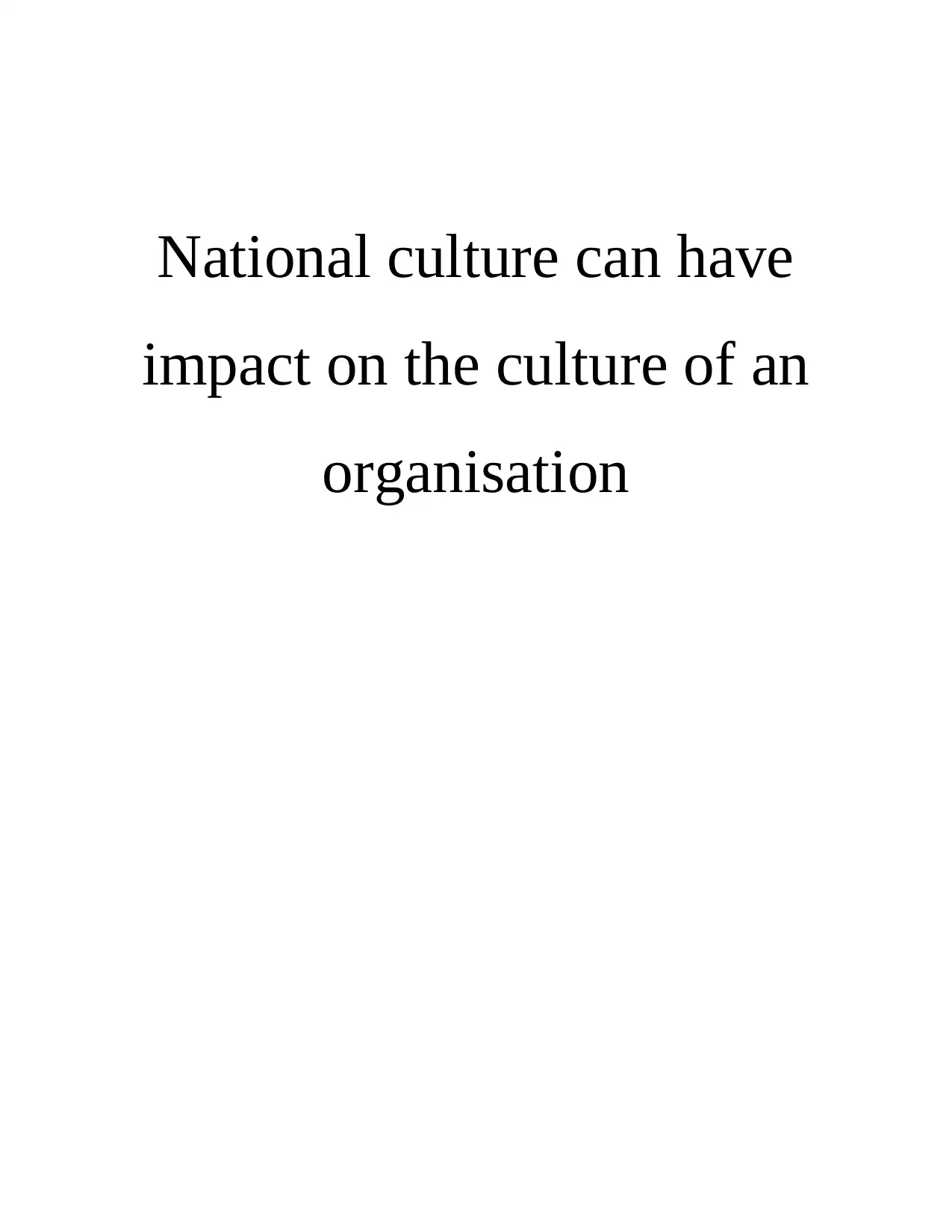
National culture can have
impact on the culture of an
organisation
impact on the culture of an
organisation
Paraphrase This Document
Need a fresh take? Get an instant paraphrase of this document with our AI Paraphraser
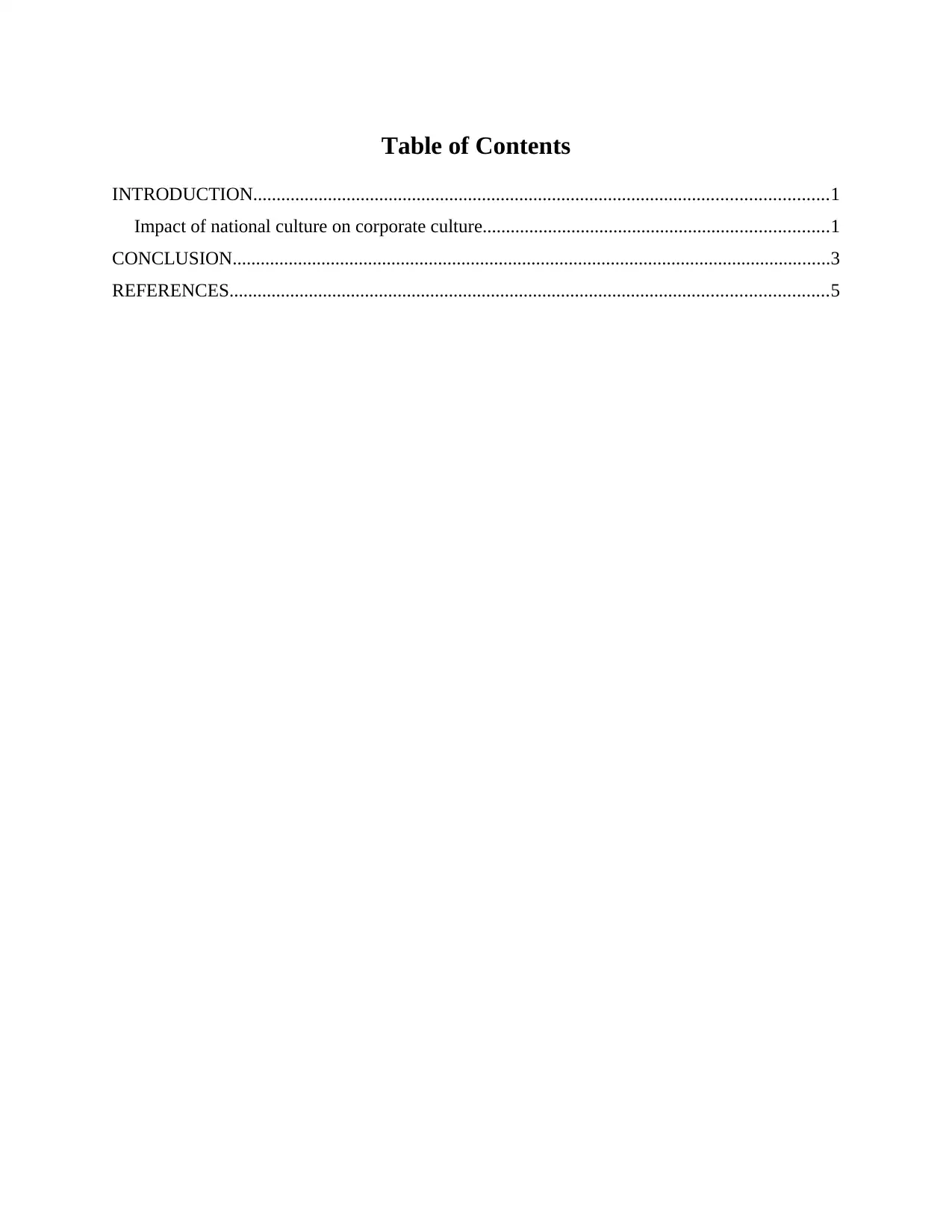
Table of Contents
INTRODUCTION...........................................................................................................................1
Impact of national culture on corporate culture..........................................................................1
CONCLUSION................................................................................................................................3
REFERENCES................................................................................................................................5
INTRODUCTION...........................................................................................................................1
Impact of national culture on corporate culture..........................................................................1
CONCLUSION................................................................................................................................3
REFERENCES................................................................................................................................5
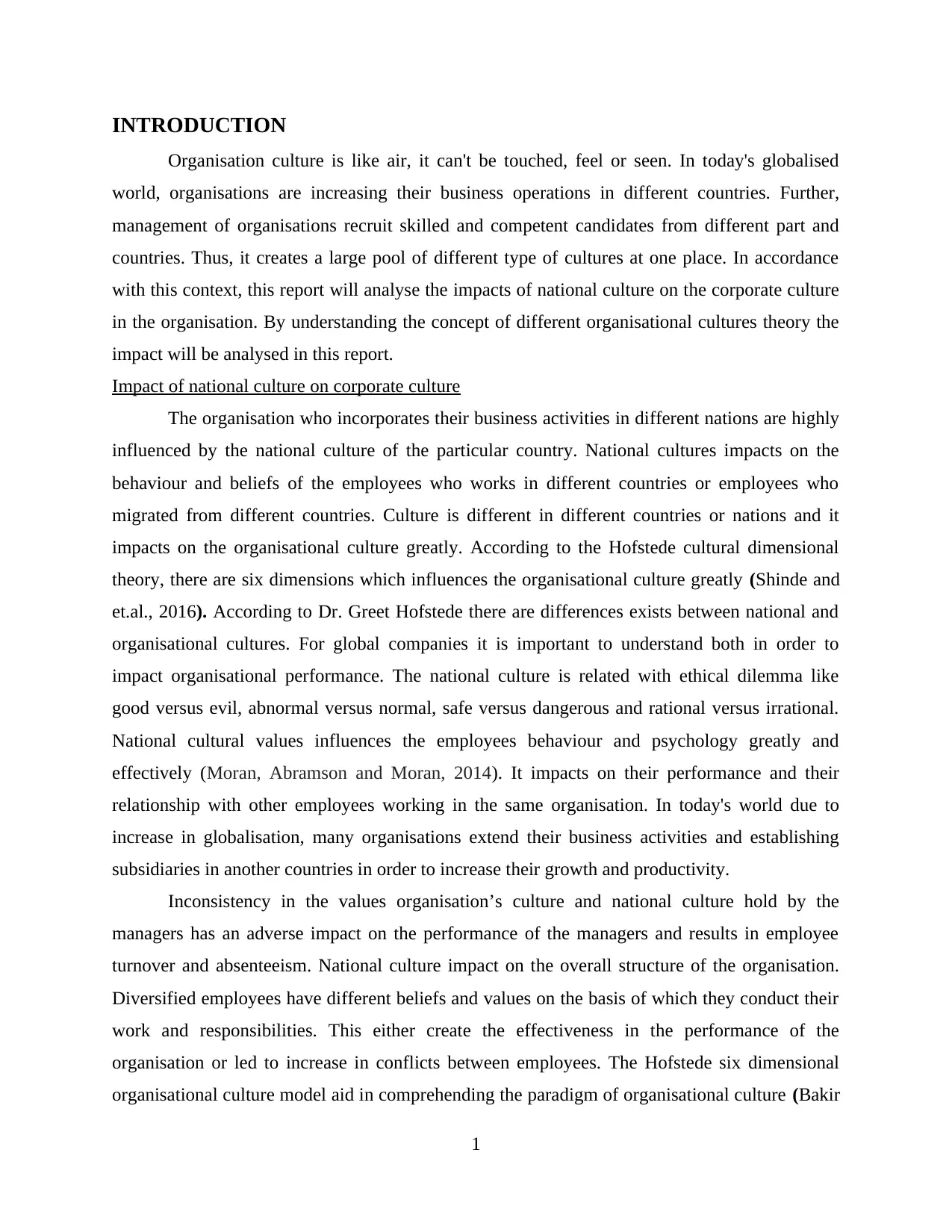
INTRODUCTION
Organisation culture is like air, it can't be touched, feel or seen. In today's globalised
world, organisations are increasing their business operations in different countries. Further,
management of organisations recruit skilled and competent candidates from different part and
countries. Thus, it creates a large pool of different type of cultures at one place. In accordance
with this context, this report will analyse the impacts of national culture on the corporate culture
in the organisation. By understanding the concept of different organisational cultures theory the
impact will be analysed in this report.
Impact of national culture on corporate culture
The organisation who incorporates their business activities in different nations are highly
influenced by the national culture of the particular country. National cultures impacts on the
behaviour and beliefs of the employees who works in different countries or employees who
migrated from different countries. Culture is different in different countries or nations and it
impacts on the organisational culture greatly. According to the Hofstede cultural dimensional
theory, there are six dimensions which influences the organisational culture greatly (Shinde and
et.al., 2016). According to Dr. Greet Hofstede there are differences exists between national and
organisational cultures. For global companies it is important to understand both in order to
impact organisational performance. The national culture is related with ethical dilemma like
good versus evil, abnormal versus normal, safe versus dangerous and rational versus irrational.
National cultural values influences the employees behaviour and psychology greatly and
effectively (Moran, Abramson and Moran, 2014). It impacts on their performance and their
relationship with other employees working in the same organisation. In today's world due to
increase in globalisation, many organisations extend their business activities and establishing
subsidiaries in another countries in order to increase their growth and productivity.
Inconsistency in the values organisation’s culture and national culture hold by the
managers has an adverse impact on the performance of the managers and results in employee
turnover and absenteeism. National culture impact on the overall structure of the organisation.
Diversified employees have different beliefs and values on the basis of which they conduct their
work and responsibilities. This either create the effectiveness in the performance of the
organisation or led to increase in conflicts between employees. The Hofstede six dimensional
organisational culture model aid in comprehending the paradigm of organisational culture (Bakir
1
Organisation culture is like air, it can't be touched, feel or seen. In today's globalised
world, organisations are increasing their business operations in different countries. Further,
management of organisations recruit skilled and competent candidates from different part and
countries. Thus, it creates a large pool of different type of cultures at one place. In accordance
with this context, this report will analyse the impacts of national culture on the corporate culture
in the organisation. By understanding the concept of different organisational cultures theory the
impact will be analysed in this report.
Impact of national culture on corporate culture
The organisation who incorporates their business activities in different nations are highly
influenced by the national culture of the particular country. National cultures impacts on the
behaviour and beliefs of the employees who works in different countries or employees who
migrated from different countries. Culture is different in different countries or nations and it
impacts on the organisational culture greatly. According to the Hofstede cultural dimensional
theory, there are six dimensions which influences the organisational culture greatly (Shinde and
et.al., 2016). According to Dr. Greet Hofstede there are differences exists between national and
organisational cultures. For global companies it is important to understand both in order to
impact organisational performance. The national culture is related with ethical dilemma like
good versus evil, abnormal versus normal, safe versus dangerous and rational versus irrational.
National cultural values influences the employees behaviour and psychology greatly and
effectively (Moran, Abramson and Moran, 2014). It impacts on their performance and their
relationship with other employees working in the same organisation. In today's world due to
increase in globalisation, many organisations extend their business activities and establishing
subsidiaries in another countries in order to increase their growth and productivity.
Inconsistency in the values organisation’s culture and national culture hold by the
managers has an adverse impact on the performance of the managers and results in employee
turnover and absenteeism. National culture impact on the overall structure of the organisation.
Diversified employees have different beliefs and values on the basis of which they conduct their
work and responsibilities. This either create the effectiveness in the performance of the
organisation or led to increase in conflicts between employees. The Hofstede six dimensional
organisational culture model aid in comprehending the paradigm of organisational culture (Bakir
1
⊘ This is a preview!⊘
Do you want full access?
Subscribe today to unlock all pages.

Trusted by 1+ million students worldwide
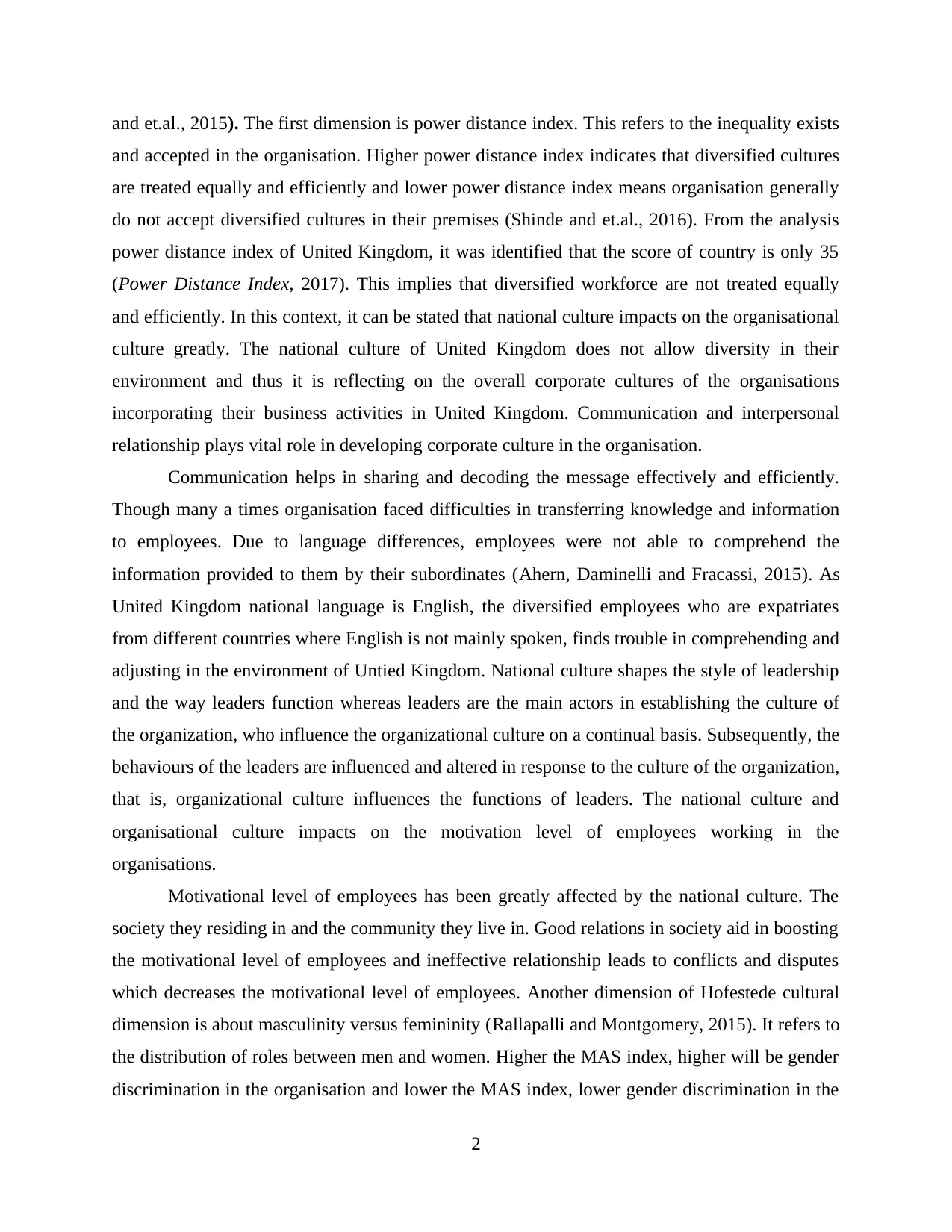
and et.al., 2015). The first dimension is power distance index. This refers to the inequality exists
and accepted in the organisation. Higher power distance index indicates that diversified cultures
are treated equally and efficiently and lower power distance index means organisation generally
do not accept diversified cultures in their premises (Shinde and et.al., 2016). From the analysis
power distance index of United Kingdom, it was identified that the score of country is only 35
(Power Distance Index, 2017). This implies that diversified workforce are not treated equally
and efficiently. In this context, it can be stated that national culture impacts on the organisational
culture greatly. The national culture of United Kingdom does not allow diversity in their
environment and thus it is reflecting on the overall corporate cultures of the organisations
incorporating their business activities in United Kingdom. Communication and interpersonal
relationship plays vital role in developing corporate culture in the organisation.
Communication helps in sharing and decoding the message effectively and efficiently.
Though many a times organisation faced difficulties in transferring knowledge and information
to employees. Due to language differences, employees were not able to comprehend the
information provided to them by their subordinates (Ahern, Daminelli and Fracassi, 2015). As
United Kingdom national language is English, the diversified employees who are expatriates
from different countries where English is not mainly spoken, finds trouble in comprehending and
adjusting in the environment of Untied Kingdom. National culture shapes the style of leadership
and the way leaders function whereas leaders are the main actors in establishing the culture of
the organization, who influence the organizational culture on a continual basis. Subsequently, the
behaviours of the leaders are influenced and altered in response to the culture of the organization,
that is, organizational culture influences the functions of leaders. The national culture and
organisational culture impacts on the motivation level of employees working in the
organisations.
Motivational level of employees has been greatly affected by the national culture. The
society they residing in and the community they live in. Good relations in society aid in boosting
the motivational level of employees and ineffective relationship leads to conflicts and disputes
which decreases the motivational level of employees. Another dimension of Hofestede cultural
dimension is about masculinity versus femininity (Rallapalli and Montgomery, 2015). It refers to
the distribution of roles between men and women. Higher the MAS index, higher will be gender
discrimination in the organisation and lower the MAS index, lower gender discrimination in the
2
and accepted in the organisation. Higher power distance index indicates that diversified cultures
are treated equally and efficiently and lower power distance index means organisation generally
do not accept diversified cultures in their premises (Shinde and et.al., 2016). From the analysis
power distance index of United Kingdom, it was identified that the score of country is only 35
(Power Distance Index, 2017). This implies that diversified workforce are not treated equally
and efficiently. In this context, it can be stated that national culture impacts on the organisational
culture greatly. The national culture of United Kingdom does not allow diversity in their
environment and thus it is reflecting on the overall corporate cultures of the organisations
incorporating their business activities in United Kingdom. Communication and interpersonal
relationship plays vital role in developing corporate culture in the organisation.
Communication helps in sharing and decoding the message effectively and efficiently.
Though many a times organisation faced difficulties in transferring knowledge and information
to employees. Due to language differences, employees were not able to comprehend the
information provided to them by their subordinates (Ahern, Daminelli and Fracassi, 2015). As
United Kingdom national language is English, the diversified employees who are expatriates
from different countries where English is not mainly spoken, finds trouble in comprehending and
adjusting in the environment of Untied Kingdom. National culture shapes the style of leadership
and the way leaders function whereas leaders are the main actors in establishing the culture of
the organization, who influence the organizational culture on a continual basis. Subsequently, the
behaviours of the leaders are influenced and altered in response to the culture of the organization,
that is, organizational culture influences the functions of leaders. The national culture and
organisational culture impacts on the motivation level of employees working in the
organisations.
Motivational level of employees has been greatly affected by the national culture. The
society they residing in and the community they live in. Good relations in society aid in boosting
the motivational level of employees and ineffective relationship leads to conflicts and disputes
which decreases the motivational level of employees. Another dimension of Hofestede cultural
dimension is about masculinity versus femininity (Rallapalli and Montgomery, 2015). It refers to
the distribution of roles between men and women. Higher the MAS index, higher will be gender
discrimination in the organisation and lower the MAS index, lower gender discrimination in the
2
Paraphrase This Document
Need a fresh take? Get an instant paraphrase of this document with our AI Paraphraser
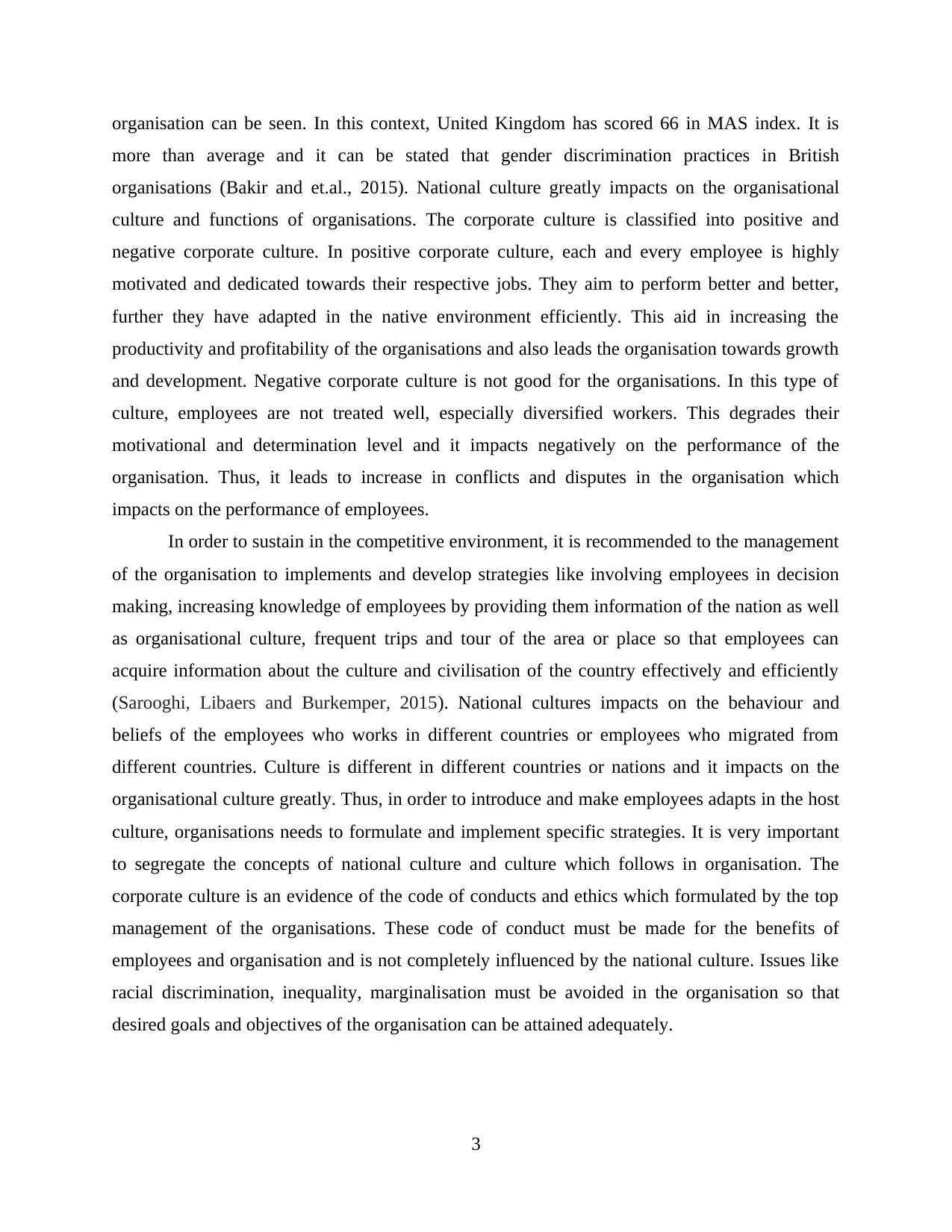
organisation can be seen. In this context, United Kingdom has scored 66 in MAS index. It is
more than average and it can be stated that gender discrimination practices in British
organisations (Bakir and et.al., 2015). National culture greatly impacts on the organisational
culture and functions of organisations. The corporate culture is classified into positive and
negative corporate culture. In positive corporate culture, each and every employee is highly
motivated and dedicated towards their respective jobs. They aim to perform better and better,
further they have adapted in the native environment efficiently. This aid in increasing the
productivity and profitability of the organisations and also leads the organisation towards growth
and development. Negative corporate culture is not good for the organisations. In this type of
culture, employees are not treated well, especially diversified workers. This degrades their
motivational and determination level and it impacts negatively on the performance of the
organisation. Thus, it leads to increase in conflicts and disputes in the organisation which
impacts on the performance of employees.
In order to sustain in the competitive environment, it is recommended to the management
of the organisation to implements and develop strategies like involving employees in decision
making, increasing knowledge of employees by providing them information of the nation as well
as organisational culture, frequent trips and tour of the area or place so that employees can
acquire information about the culture and civilisation of the country effectively and efficiently
(Sarooghi, Libaers and Burkemper, 2015). National cultures impacts on the behaviour and
beliefs of the employees who works in different countries or employees who migrated from
different countries. Culture is different in different countries or nations and it impacts on the
organisational culture greatly. Thus, in order to introduce and make employees adapts in the host
culture, organisations needs to formulate and implement specific strategies. It is very important
to segregate the concepts of national culture and culture which follows in organisation. The
corporate culture is an evidence of the code of conducts and ethics which formulated by the top
management of the organisations. These code of conduct must be made for the benefits of
employees and organisation and is not completely influenced by the national culture. Issues like
racial discrimination, inequality, marginalisation must be avoided in the organisation so that
desired goals and objectives of the organisation can be attained adequately.
3
more than average and it can be stated that gender discrimination practices in British
organisations (Bakir and et.al., 2015). National culture greatly impacts on the organisational
culture and functions of organisations. The corporate culture is classified into positive and
negative corporate culture. In positive corporate culture, each and every employee is highly
motivated and dedicated towards their respective jobs. They aim to perform better and better,
further they have adapted in the native environment efficiently. This aid in increasing the
productivity and profitability of the organisations and also leads the organisation towards growth
and development. Negative corporate culture is not good for the organisations. In this type of
culture, employees are not treated well, especially diversified workers. This degrades their
motivational and determination level and it impacts negatively on the performance of the
organisation. Thus, it leads to increase in conflicts and disputes in the organisation which
impacts on the performance of employees.
In order to sustain in the competitive environment, it is recommended to the management
of the organisation to implements and develop strategies like involving employees in decision
making, increasing knowledge of employees by providing them information of the nation as well
as organisational culture, frequent trips and tour of the area or place so that employees can
acquire information about the culture and civilisation of the country effectively and efficiently
(Sarooghi, Libaers and Burkemper, 2015). National cultures impacts on the behaviour and
beliefs of the employees who works in different countries or employees who migrated from
different countries. Culture is different in different countries or nations and it impacts on the
organisational culture greatly. Thus, in order to introduce and make employees adapts in the host
culture, organisations needs to formulate and implement specific strategies. It is very important
to segregate the concepts of national culture and culture which follows in organisation. The
corporate culture is an evidence of the code of conducts and ethics which formulated by the top
management of the organisations. These code of conduct must be made for the benefits of
employees and organisation and is not completely influenced by the national culture. Issues like
racial discrimination, inequality, marginalisation must be avoided in the organisation so that
desired goals and objectives of the organisation can be attained adequately.
3
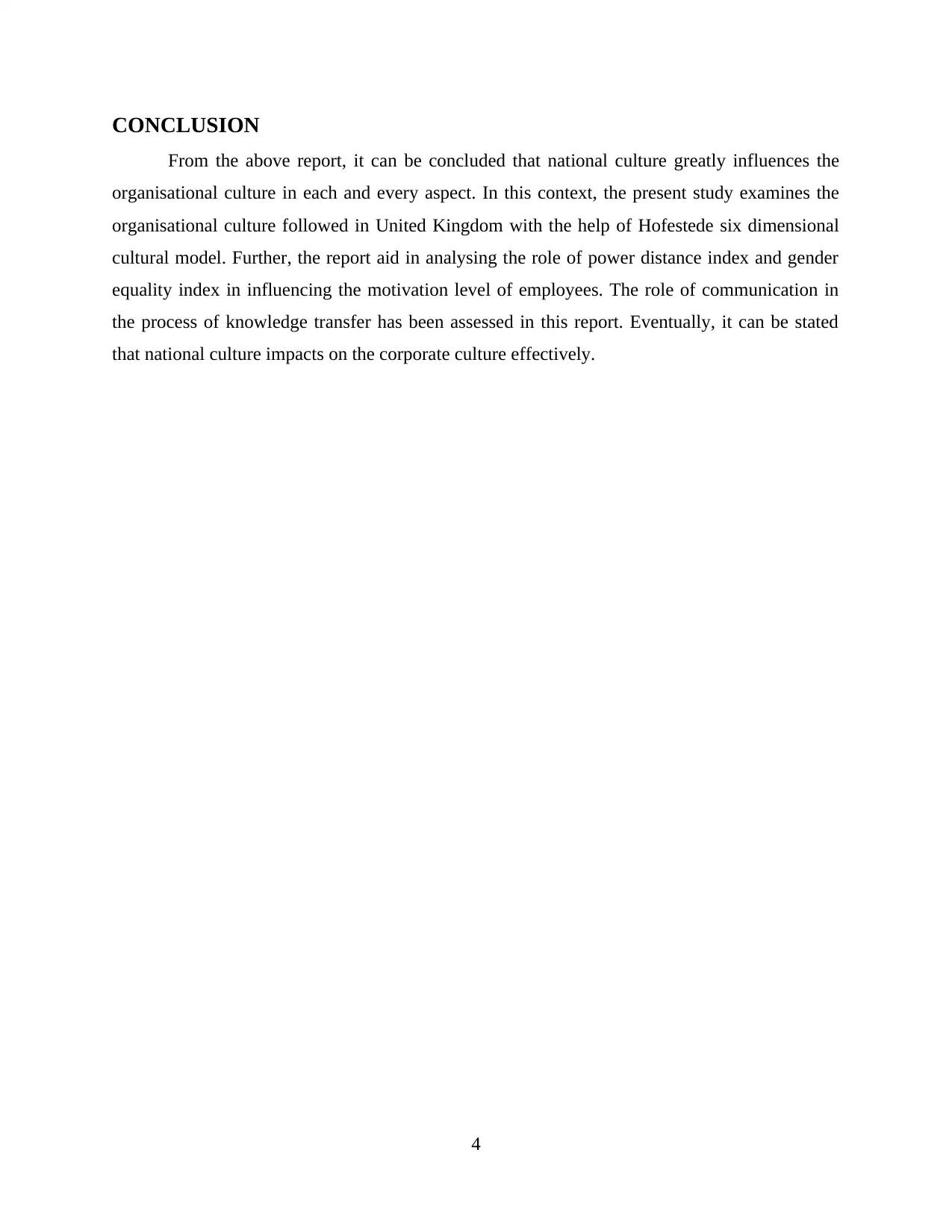
CONCLUSION
From the above report, it can be concluded that national culture greatly influences the
organisational culture in each and every aspect. In this context, the present study examines the
organisational culture followed in United Kingdom with the help of Hofestede six dimensional
cultural model. Further, the report aid in analysing the role of power distance index and gender
equality index in influencing the motivation level of employees. The role of communication in
the process of knowledge transfer has been assessed in this report. Eventually, it can be stated
that national culture impacts on the corporate culture effectively.
4
From the above report, it can be concluded that national culture greatly influences the
organisational culture in each and every aspect. In this context, the present study examines the
organisational culture followed in United Kingdom with the help of Hofestede six dimensional
cultural model. Further, the report aid in analysing the role of power distance index and gender
equality index in influencing the motivation level of employees. The role of communication in
the process of knowledge transfer has been assessed in this report. Eventually, it can be stated
that national culture impacts on the corporate culture effectively.
4
⊘ This is a preview!⊘
Do you want full access?
Subscribe today to unlock all pages.

Trusted by 1+ million students worldwide
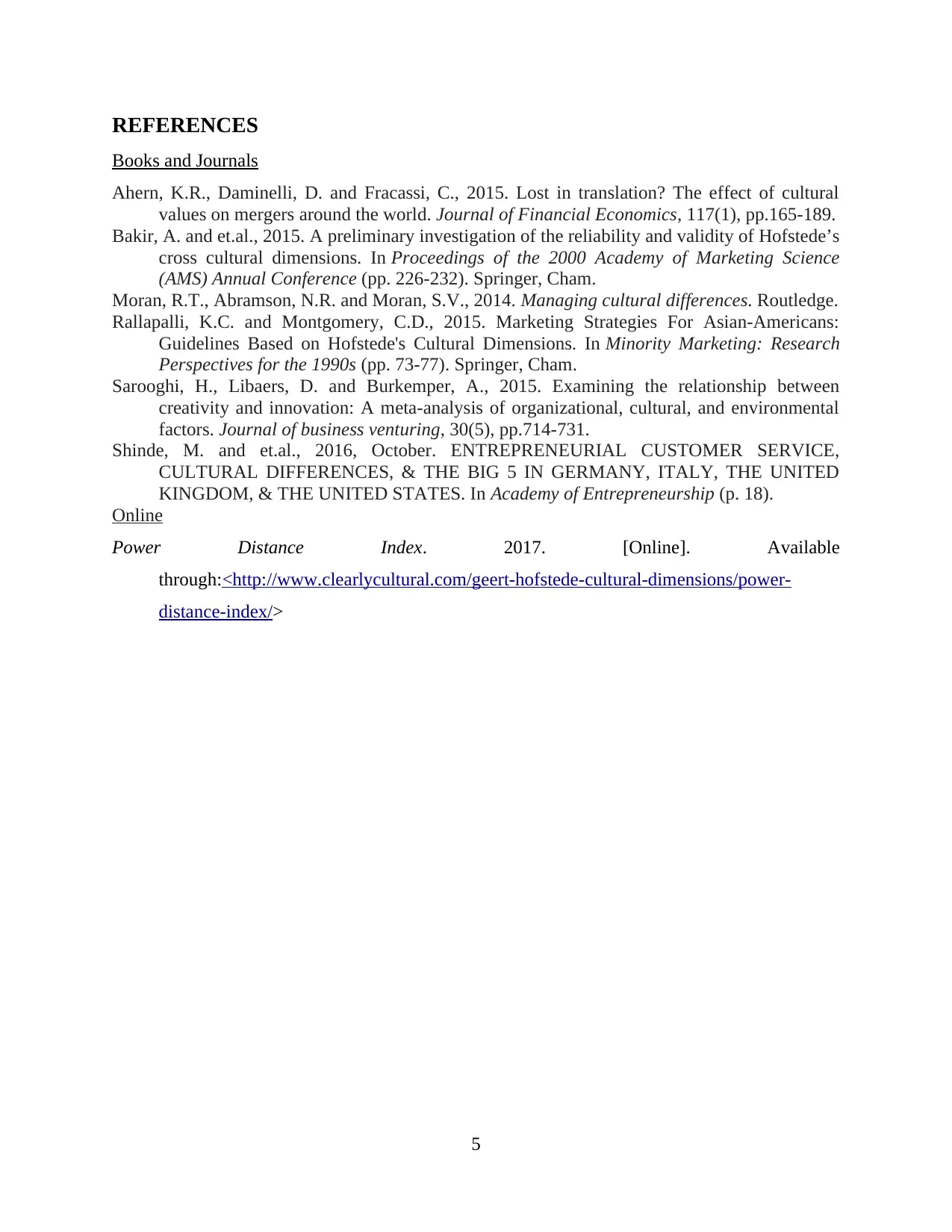
REFERENCES
Books and Journals
Ahern, K.R., Daminelli, D. and Fracassi, C., 2015. Lost in translation? The effect of cultural
values on mergers around the world. Journal of Financial Economics, 117(1), pp.165-189.
Bakir, A. and et.al., 2015. A preliminary investigation of the reliability and validity of Hofstede’s
cross cultural dimensions. In Proceedings of the 2000 Academy of Marketing Science
(AMS) Annual Conference (pp. 226-232). Springer, Cham.
Moran, R.T., Abramson, N.R. and Moran, S.V., 2014. Managing cultural differences. Routledge.
Rallapalli, K.C. and Montgomery, C.D., 2015. Marketing Strategies For Asian-Americans:
Guidelines Based on Hofstede's Cultural Dimensions. In Minority Marketing: Research
Perspectives for the 1990s (pp. 73-77). Springer, Cham.
Sarooghi, H., Libaers, D. and Burkemper, A., 2015. Examining the relationship between
creativity and innovation: A meta-analysis of organizational, cultural, and environmental
factors. Journal of business venturing, 30(5), pp.714-731.
Shinde, M. and et.al., 2016, October. ENTREPRENEURIAL CUSTOMER SERVICE,
CULTURAL DIFFERENCES, & THE BIG 5 IN GERMANY, ITALY, THE UNITED
KINGDOM, & THE UNITED STATES. In Academy of Entrepreneurship (p. 18).
Online
Power Distance Index. 2017. [Online]. Available
through:<http://www.clearlycultural.com/geert-hofstede-cultural-dimensions/power-
distance-index/>
5
Books and Journals
Ahern, K.R., Daminelli, D. and Fracassi, C., 2015. Lost in translation? The effect of cultural
values on mergers around the world. Journal of Financial Economics, 117(1), pp.165-189.
Bakir, A. and et.al., 2015. A preliminary investigation of the reliability and validity of Hofstede’s
cross cultural dimensions. In Proceedings of the 2000 Academy of Marketing Science
(AMS) Annual Conference (pp. 226-232). Springer, Cham.
Moran, R.T., Abramson, N.R. and Moran, S.V., 2014. Managing cultural differences. Routledge.
Rallapalli, K.C. and Montgomery, C.D., 2015. Marketing Strategies For Asian-Americans:
Guidelines Based on Hofstede's Cultural Dimensions. In Minority Marketing: Research
Perspectives for the 1990s (pp. 73-77). Springer, Cham.
Sarooghi, H., Libaers, D. and Burkemper, A., 2015. Examining the relationship between
creativity and innovation: A meta-analysis of organizational, cultural, and environmental
factors. Journal of business venturing, 30(5), pp.714-731.
Shinde, M. and et.al., 2016, October. ENTREPRENEURIAL CUSTOMER SERVICE,
CULTURAL DIFFERENCES, & THE BIG 5 IN GERMANY, ITALY, THE UNITED
KINGDOM, & THE UNITED STATES. In Academy of Entrepreneurship (p. 18).
Online
Power Distance Index. 2017. [Online]. Available
through:<http://www.clearlycultural.com/geert-hofstede-cultural-dimensions/power-
distance-index/>
5
1 out of 7
Related Documents
Your All-in-One AI-Powered Toolkit for Academic Success.
+13062052269
info@desklib.com
Available 24*7 on WhatsApp / Email
![[object Object]](/_next/static/media/star-bottom.7253800d.svg)
Unlock your academic potential
Copyright © 2020–2025 A2Z Services. All Rights Reserved. Developed and managed by ZUCOL.





